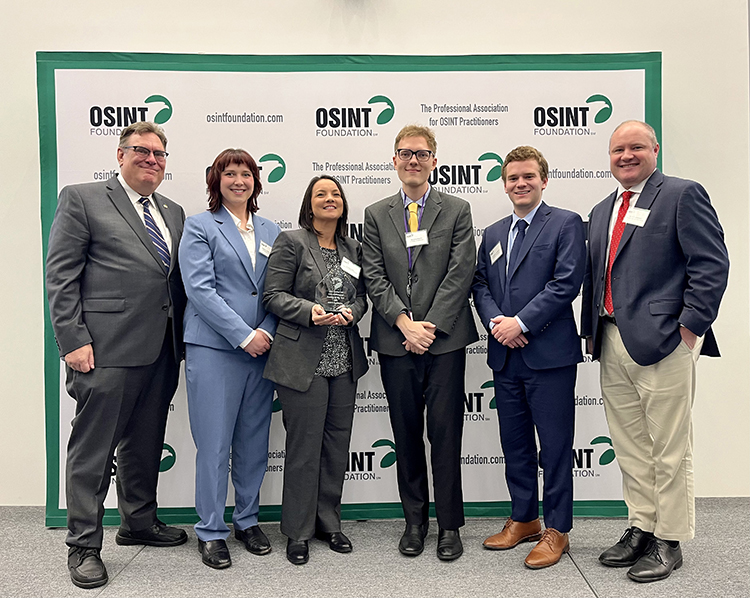Open source intelligence foundation selects university’s security studies center for top honor
THE OSINT Foundation awarded its first OSINT Product of the Year to a research project led by students at University of Mississippi Center for Intelligence and Security Studies.
The OSINT Foundation is a national nonprofit organization dedicated to promoting open source intelligence and developing professionals in the intelligence community. The selected foundation Publication by UM students in the National Geospatial-Intelligence Agency Project Tearline“China’s Interests in Montenegro: Alternative Analysis Case Study – Debt Traps Revisited,” for an award that recognizes research that “has demonstrated exceptional value to the nation,” according to the award notification.
“It’s an honor to be selected for the inaugural OSINT Product of the Year,” said Shaio Zerba, director of the Center for Intelligence and Security Studies. “I am very proud of the students and faculty who worked as a team to produce this exceptional open source intelligence article. »
For more than eight months, five Ole Mademoiselle students searched for publicly available information regarding Initiative and Montenegrin-Chinese road belt loan 2014 agreement. The students found that while a default by Montenegro is unlikely, the consequences of such a failure could include China gain railways, ports and other infrastructure in the Balkan country.
“The Tearline Project’s writing standards are exceptionally high,” said Chris Rasmussen, Tearline project manager for the National Geospatial-Intelligence Agency. “This report on Montenegro was particularly difficult due to the fragmented nature of reporting on state-owned assets. It took incredible attention to detail to prove that these were government-backed assets.
THE NGA Tearline Project is an open source intelligence platform created to expand analytical reach with external groups and encourage in-depth understanding of diverse topics for the intelligence community. Researchers writing for the Tearline Project run the gamut, from undergraduates to postdoctoral researchers and think tank members, Rasmussen said.
The five students, all members of the Center of Open Source Analysis, a UM student-led analysis group that works to publish open source intelligence on national security issues, contacted the NGA in fall 2022 to contribute to the Tearline project .
“They wanted to be part of the project,” Rasmussen said. “The Montenegro case was an existing project…but it needed a group of qualified people to get it over the goal line. »
Sydney Lyncha major in art history and classics of Long Island, New York, led the ring road project in Montenegro. She said the students never thought their efforts could win an award.
“When we worked on this project, we didn’t think our inaugural piece would be the product of the year,” Lynch said. “It wasn’t on our radar. We focused on creating this piece applicable to the intelligence world.
Students spent months identifying and analyzing open source information and commercial imagery in Montenegro to determine which state assets could be subject to seizure in the event of a breach of contract. Furthermore, the group examined the financial situation of Montenegro.
Senior accounting and Chinese specialization Zach Partinof Collierville, Tennesseespent most of his time on the financial entity examination project in Montenegro and China.
“One of the main reasons I wanted to do it is I want to do intelligence work, and this is intelligence work,” Partin said. “It’s as close as you can get without going through an agency. That was a big attraction for me.
Lee Holmesan international studies junior and Arab middle finger Tullahoma, Tennesseejoined the cohort of student researchers last fall as an editor.
“It made me realize there was a lot more information available,” Holmes said. “Writing about Montenegro’s Belt Initiative, I realized how much we don’t know and how much we still have to learn.
“There are so many more things that affect everything that we don’t even realize – it’s like unfurling rose petals of knowledge. »
Now that Project Montenegro is complete, the university has partnered with Project Tearline again this fall to create a new intelligence report on climate change in the country. Benelux region of Europeincluding BelgiumTHE The NetherlandsAnd Luxembourg. Lynch is directing the new project.
“The team is really fantastic,” she said. “Everyone is new, but there are also a lot of underclassmen that we want to train so that when we graduate, we have someone to pass the torch to and Ole Miss is a ongoing Tearline project.”
By Clara Turnage



